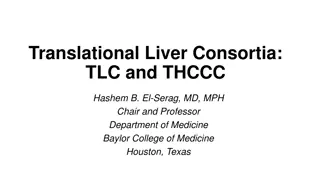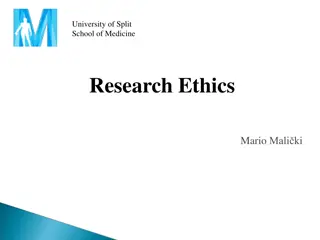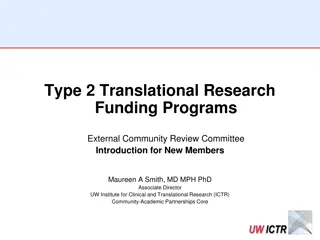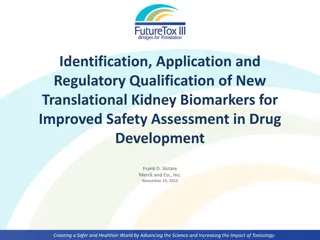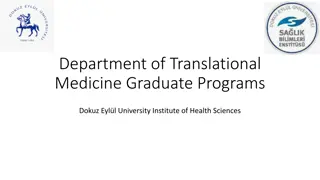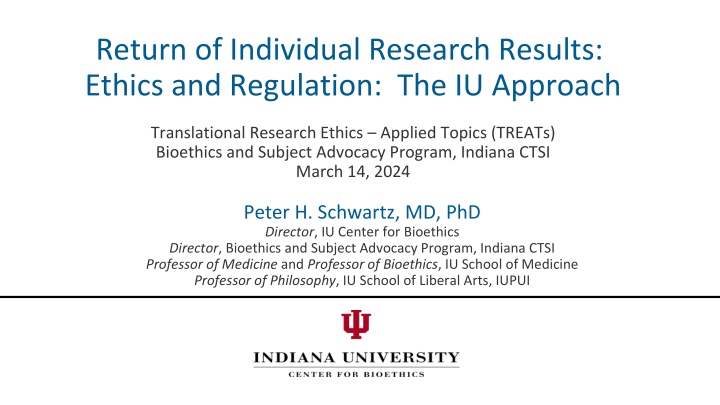
Ethics and Regulation: The IU Approach in Translational Research
This presentation discusses the ethical considerations and regulations surrounding the return of individual research results, emphasizing the distinctive approach of the Indiana University (IU) in translational research ethics. It delves into key aspects such as conflicts of interest, traditional views on healthcare versus research, types of findings, and crucial ethical shifts in research practices.
Download Presentation

Please find below an Image/Link to download the presentation.
The content on the website is provided AS IS for your information and personal use only. It may not be sold, licensed, or shared on other websites without obtaining consent from the author. If you encounter any issues during the download, it is possible that the publisher has removed the file from their server.
You are allowed to download the files provided on this website for personal or commercial use, subject to the condition that they are used lawfully. All files are the property of their respective owners.
The content on the website is provided AS IS for your information and personal use only. It may not be sold, licensed, or shared on other websites without obtaining consent from the author.
E N D
Presentation Transcript
Return of Individual Research Results: Ethics and Regulation: The IU Approach Translational Research Ethics Applied Topics (TREATs) Bioethics and Subject Advocacy Program, Indiana CTSI March 14, 2024 Peter H. Schwartz, MD, PhD Director, IU Center for Bioethics Director, Bioethics and Subject Advocacy Program, Indiana CTSI Professor of Medicine and Professor of Bioethics, IU School of Medicine Professor of Philosophy, IU School of Liberal Arts, IUPUI
Conflict of Interest and Acknowledgements I have no conflicts of interest to report. Special thanks to Amy Waltz, Bethany Johnson, and the other members of the IRB working group that developed the IU guidelines.
Traditional view Healthcare vs. Research Patient vs. Research subject (participant) Goal of activity Healthcare: Treatment and prevention Research: Scientific and medical progress Responsibility towards the individual Healthcare: Improve or protect health of the patient Research: Minimize or avoid harm to the participant Reason for the individual to participate: Patient: Improve health (self-oriented) Research participant: Benefit future patients (other-oriented, altruism)
Return of results Types of findings: Primary Secondary Incidental Any of these results can have important implications for patient health: E.g., Genetics, e.g. BRCA1 Xray/ radiology, e.g. brain tumor Lab tests, e.g. potassium 7 PHQ9 (depression score), e.g. suicidality
Traditional view Do not return results to individuals, since research particpants are not patients, and the project goal is research not healthcare. Only (possible) exception: Safety issues (e.g. potassium of 7 or suicidality), which are generally disclosed to healthcare providers Explicit statement included in informed consent that the participant will not receive any results.
Key Changes Reconsideration of ethical issues: Is withholding potentially useful information a form of harm? Duty of rescue: E.g., you are running for exercise tomorrow and see a child about to walk into the street. Many believe you have an obligation to try to stop him, due to the great benefit to him and minimal risk or burden on you. Blurring the line between healthcare and research Research that involves clinical care; e.g., Clinical trials Healthcare that also serves as the basis for research; e.g., retrospective studies Changing view of research participant Subject Participant (active partner) Community based participatory research (CBPR) Reimbursement of participants
Genetics: Clinical setting American College of Medical Genetics and Genomics (2013): When whole genome or exome sequencing is being performed clinically, 81 genes should always be tested, and the presence of any actionable variants should be disclosed to patients. E.g. BRCA Independent of the reason for testing. Allow patients to opt out How apply to the research setting? Geisinger s MyCode biobank Focus groups Resulting guidelines
Update in common rule (2016) Informed consent document should include: A statement regarding whether clinically relevant research results, including individual research results, will be disclosed to subjects, and if so, under what conditions. (45 CFR 46.116(c)(8))
Four types of research findings (bins) 1. Significant for the person s health in the near future, potentially involving risk of death or severe morbidity, and interventions are available that improve outcomes. 2. Significant for the person s health but not in the near future, and interventions are available that improve outcomes. 3. Significant for the person s health but there are no interventions available that improve outcomes. 4. Unclear significance for the person s health, and no interventions that improve outcomes.
Four types of research findings (bins) 1. Significant for the person s health in the near future, potentially involving risk of death or severe morbidity, and interventions are available that improve outcomes. 2. Significant for the person s health but not in near future, and interventions are available that improve outcomes. 3. Significant for the person s health but there are no interventions available that improve outcomes. 4. Unclear significance for the person s health, and no interventions that improve outcomes. Benefits of disclosure: Medical Personal Risks of disclosure Misuse Anxiety As you go down the list: Decreasing benefits Increasing possibility of misuse
Four types of research findings (bins) 1. Significant for the person s health in the near future, potentially involving risk of death or severe morbidity, and interventions are available that improve outcomes. 2. Significant for the person s health but not in near future, and interventions are available that improve outcomes. 3. Significant for the person s health but there are no interventions available that improve outcomes. 4. Unclear significance for the person s health, and no interventions that improve outcomes. Must disclose to participants or providers Should disclose to participants or providers May or may not disclose to participants or providers Should not disclose to participants or providers
Important caveats and considerations Limitations of resources, effort, and expertise. Not ethically required to look for findings that might be relevant to research participants. No duty to hunt, even for Bin 1 or 2 results. May choose to obtain and return results as part of inducement to participation Consider benefits and risks of disclosure
Important caveats and considerations Patients must be asked for consent: Explain system for return of results. Planning system for return of results: Who: Researcher, clinician, genetic counselor How: Explaining results and implications Implications: How patients can receive follow-up care
Important caveats and considerations Cannot return lab results that were obtained in a lab that is not CLIA certified. Danger of returning results that are not clinically valid. No ethical or regulatory requirement to have a licensed radiologist review all scans. No obligation to return of results obtained during secondary analysis of research
Bottom line Anticipate results that might be relevant to your participants health or desired by them. Decide whether you will return those results, taking into consideration Category of the results (Bins 1-4) Benefits and risks Process for return, resources required Disclose plan during informed consent and allow participants to decide, at least for Bins 2-4. IRB role
Resources National Academies of Science, Engineering, and Medicine (NASEM) (2018), Return of Individual-Specific Research Results Generated in Research Laboratories, https://www.nationalacademies.org/our-work/return-of-individual- specific-research-results-generated-in-research-laboratories Multi-Regional Clinical Trials (MRCT) Center, Brigham and Women s Hospital, Harvard (2017), Return of Individual Results, https://mrctcenter.org/blog/projects/return-of-individual-results/
Resources Free consultation from the Bioethics and Subject Advocacy Program (BSAP) of the Indiana CTSI. Webpage: https://bioethics.iu.edu/ethics-research/index.html Request form: https://bioethics.iu.edu/ethics-research/request- consult.html Email: phschwar@iu.edu or BSAP@iu.edu Contact: Nic Oliver, MA, Program manager, olivnj@iu.edu



